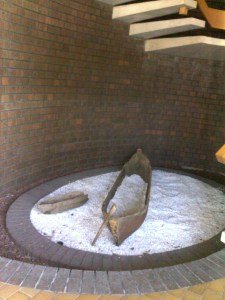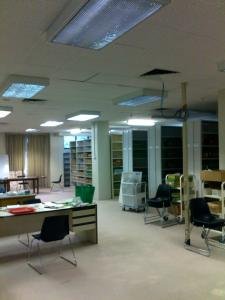By Sam Hedditch, Graduate Diploma in Archaeology Student
This is the first of my four blog posts in regards to the Cultural Heritage Practicum topic at Flinders. I will briefly describe what type of work I will be completing while under the employ of the Museum.
My predominant focus in the practicum will be lithics, or stone artefacts, which are a great interest of mine. I am working for Dr Keryn Walshe, Head Archaeologist and Researcher for the South Australian Museum. Keryn has done some amazing work in documentation and in archaeology in general. Her book, Roonka: Fugitive Traces and Climatic Mischief, is evidence of her skills and knowledge in Aboriginal cultural material. I consider myself to be very privileged to be working for her in this program and I am sure to learn a great deal.
I am principally working at the Hindmarsh store of the SA Museum. This was recently taken up by the museum having previously been used as an old state library storage space. There are an astounding number of artefacts and papers regarding archaeological work and material that are stored here. Many of the items currently at the store are donations from benefactors and are yet to be accessioned. Going through this material will form a large part of my practicum at the museum.

Canoe at entrance to State Library Building.
Correctly recording and cataloguing items is a very important job at museums and is the only way to account for the whereabouts of so many types of artefacts.
In some collections I will give a rough description of the type of artefact, the raw material of the artefact and any noteworthy features. The goal is to store the items appropriately so that they are more readily available for analysis in the future. Many challenges occur in this process as the paper, tape or marker used to note the artefacts may have worn out since its original collection by the benefactor and their interpretations of the type of artefact may differ entirely from current conventions.

Shelves at Hindmarsh store. My workspaces is on the left.
I have met a number of other researchers and volunteers at the store, and have been lucky enough to work closely with some on certain collections. They have a great deal of knowledge about their respective topics and working with such people will benefit my overall educational experience throughout my placement. I have already seen some rare and stunning examples of pre- and post-contact artefacts and can’t wait to see more.
Until next time, it’s back to the shelves for me!
 Featured on EcoPressed Fast fashion's ethical makeover?
Featured on EcoPressed Fast fashion's ethical makeover?


Pingback: The research potential of the South Australian Museum Collections | Flinders Archaeology Blog